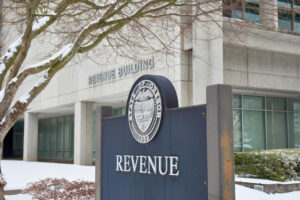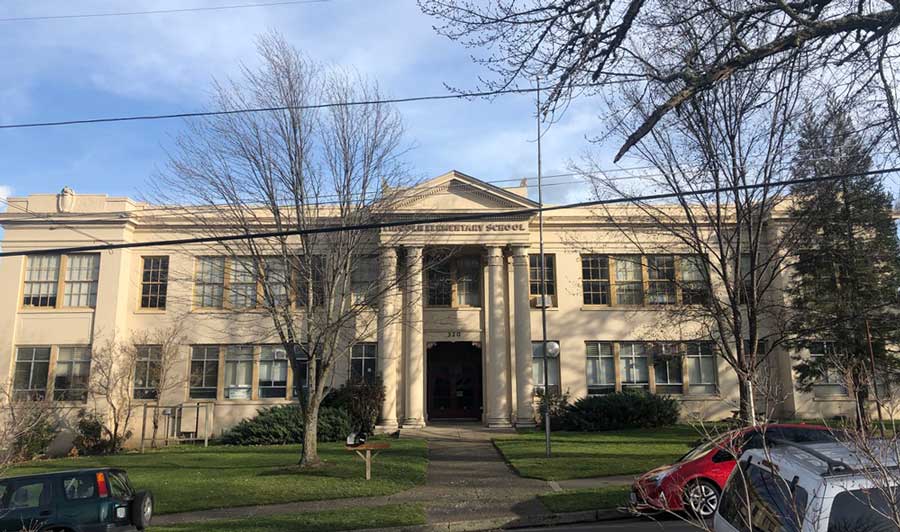The shutdown, pushed by the Trump Administration and Congress, cuts funding to National Public Radio and the Public Broadcasting System, and threatens regional affliates including OPB and All Classical Radio
By Bob Hicks for Oregon ArtsWatch
The Corporation for Public Broadcasting, beset by massive defunding by Congress under pressure from the Trump Administration, announced Friday that it will be forced to shut down next year. CPB will spend the next several months winding down its operations following a $1.1 billion congressional clawback of funds previously approved for the next seven years, CPB said in a news story published Aug. 1.
For more than half a century CPB, which was founded in 1967, has provided crucial federal funding to the Public Broadcasting System and National Public Radio, which in turn help bankroll local and regional broadcasters across the nation, including Oregon Public Broadcasting, Portland radio stations All Classical Radio, KBOO-FM, and jazz station KMHD, and Southern Oregon PBS and Jefferson Public Radio in Southern Oregon.
The announcement of the CPB shutdown comes as Oregon Humanities is about to go to federal court in Portland on Monday, Aug. 4, to challenge the Trump Administration’s clawback of previously approved funding to the National Endowment for the Humanities and its 56 regional affiliates, including Oregon Humanities. (Read Jim Redden’s ArtsWatch story about the lawsuit here.)
CPB will continue to support public broadcasters through a transition period that will end in January, The New York Times reported, citing Patricia Harrison, the corporation’s president and chief executive. Most positions will be eliminated by the end of September, The Times said.
“After that, a small contingent of employees will stay on through January to wind it down,” The Times’ story continued. “Those employees will focus on making the corporation’s last distributions, resolving its financial obligations and sorting out the long-term fate of rights and royalties for music played on public media stations across the United States.”
What the fate will be for Oregon affiliates and others across the country isn’t known, although the picture is grim. “OPB will lose about $5 million annually — about 9 percent of its total budget — because of the takeback of money previously approved by Congress,” ArtsWatch reported in mid-July. “All Classical will lose $500,000 for each of the next two years, 10 percent of its budget. KBOO is losing about $110,000 annually, roughly 10 percent of its budget.”
In addition, Jefferson Public Radio reports that the elimination of CPB funding creates “an immediate $525,000 deficit” in its current fiscal year, which began July 1. And Phil Meyer, CEO of Southern Oregon PBS, reports that the federal cutbacks will cost his stations, which serve about 500,000 viewers over 18,000 square miles in Southern Oregon and Northern California, about $1 million in each of the next two years. The Corporation for Public Broadcasting grants had amounted to 37 percent of Southern Oregon PBS’s revenue for fiscal year 2025.
Many public radio and television stations have already begun emergency fund drives, and stations such as KUOW in Seattle “are seeing a big surge in donations in response to the cuts,” CPB said. The New York Times story added: “Experts say that those donations by themselves will not be sufficient to offset the elimination in government funding, however, and that a broader overhaul of the public broadcasting system is needed.”
And ArtsWatch’s mid-July story quoted OPB as declaring that the cuts will not be evenly felt: “People living in rural and remote areas will be especially hard hit as federal funding helps cover the costs of serving people in hard-to-reach places.”
The crunch is real, and potentially life-threatening to local and regional affiliates.
“This is catastrophic,” Suzanne Nance, president and CEO of Portland’s All Classical Radio, said on social media Friday. “All Classical Radio has lost $1,000,000 in funding previously approved ($500k this year and $500k next year). Unfortunately, in addition to that critical funding (through CPB’s community service grants) the CPB will no longer exist to negotiate or pay for music licenses. That will be an additional expense and an incredible burden on All Classical and stations across the country.”
Public radio and television have been targeted for decades by right-wing politicians, who have declared that the stations are too liberal and are unfair to conservative and right-wing causes — charges that the stations and their supporters have largely denied. But this year’s actions, pushed by the Trump Administration and rubber-stamped by Congress, which had earlier approved funding, were the first to cause such chaos, and they have the potential to see the nation’s public broadcasting system dismantled.
“NPR, which produces news programs such as Morning Edition and All Things Considered, relies on direct federal funds for only a small portion of its budget,” CPB’s Friday news story said. “But its approximately 1,000 member stations receive a heftier portion of their operating revenue through CPB. Those in rural and poor areas in particular rely on CPB grants. With its nightly PBS News Hour and children’s programming, such as ‘Daniel Tiger’s Neighborhood,’ PBS gets around 15% of its revenue from federal money, as do its member stations on average.
“The ripple effects of this closure will be felt across every public media organization and, more importantly, in every community across the country that relies on public broadcasting,” NPR President and CEO Katherine Maher said in a statement.
Bob Hicks is executive editor of Oregon ArtsWatch and has covered arts and culture from the Pacific Northwest for more than 40 years. Email him at [email protected].
Aug 5: This story has been updated with new information from Phil Meyer, CEO of Southern Oregon PBS.
Related story: Southern Oregon public media faces huge shortfalls after Senate votes to cancel funding (July 16)


















![United States’ cities average electricity price per kWh. U.S. Bureau of Labor Statistics, APU000072610], retrieved from FRED, Federal Reserve Bank of St. Louis; https://fred.stlouisfed.org/series/APU000072610, Nov. 10, 2025.](https://ashland.news/wp-content/uploads/2025/11/Power-graphic.jpg)


